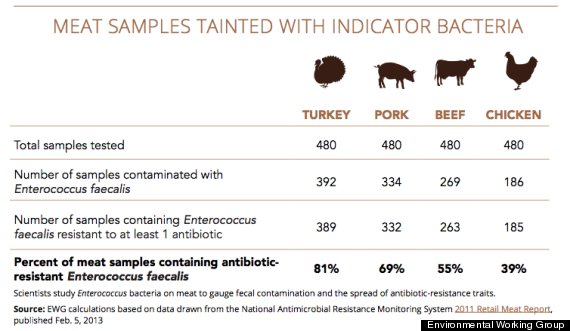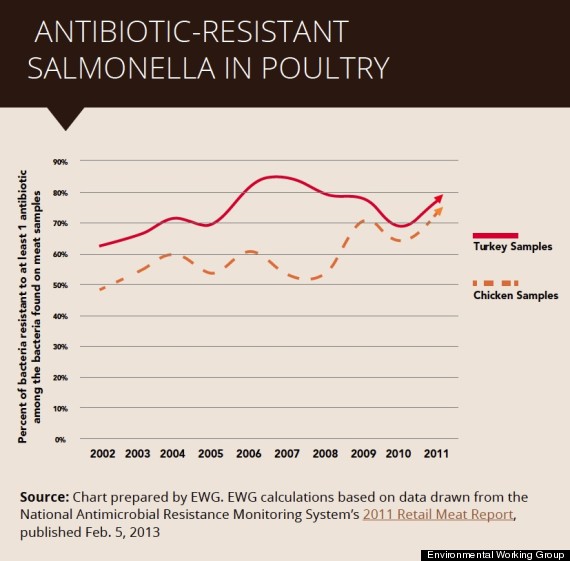A new analysis of data collected by federal scientists suggests that a shockingly-high percentage of meat sold in U.S. supermarkets is contaminated with antibiotic-resistant bacteria.
Based on findings from the National Antimicrobial Resistance Monitoring System, which were published in February but went largely overlooked, the Environmental Working Group found such bacteria in 81 percent of raw ground turkey, 69 percent of raw pork chops, 55 percent of raw ground beef and 39 percent of raw chicken parts purchased in stores in 2011.
These microbes are superbug versions of pathogens that, even in their milder forms, have devastating potential, including salmonella, E. coli and Campylobacter jejuni. The EWG report also pointed to other studies that suggest there are concerning levels of pathogens such as Yersinia enterocolitica and Staphylococcus aureus in meat.

In an agency press release, EWG nutritionist and the report's lead researcher, Dawn Undurraga, issued a warning to the public:
“Consumers should be very concerned that antibiotic-resistant bacteria are now common in the meat aisles of most American supermarkets ... These organisms can cause foodborne illnesses and other infections. Worse, they spread antibiotic-resistance, which threatens to bring on a post-antibiotic era where important medicines critical to treating people could become ineffective.”
The rate at which these superbugs are spreading is particularly alarming. In 2002, 50 percent of salmonella microbes found in raw chicken were antibiotic-resistant, according to EWG research which draws from government data. In 2011 samples, that number increased to 74 percent.

Experts at EWG say that the boom in superbugs is directly related to the increased use of antibiotics by factory farms. The report writes that industrial livestock producers "routinely dose their animals with pharmaceuticals, mostly administered with limited veterinary oversight and frequently without prescriptions, to encourage faster growth or prevent infection in crowded, stressful and often unsanitary living conditions."
It's long been known that overuse of antibiotics in humans can lead to antibiotic resistance -- the Mayo Clinic warns that it can lead to more difficult-to-treat infections, longer-lasting illnesses that can include hospital stays and the use of more expensive and potentially toxic medications -- and EWG posits that this is happening now in livestock. When humans consume the animals' meat, the superbug pathogens can be passed along as well.
According to the report, about 30 million pounds of antibiotics were used on domestic livestock in 2011 -- an increase of about 22 percent from 2005 sales by weight. At present, antibiotics used for livestock account for about 80 percent of the American antibiotics market, which, the EWG believes, gives the pharmaceutical industry a financial incentive to promote them.
Read the full EWG report here.
'庫間 > 해외자료' 카테고리의 다른 글
| 잡초를 최대로 억제하기 위한 덮개작물의 파종과 관리 (0) | 2013.04.18 |
|---|---|
| 토지수탈이 유럽으로 확장되고 있다 (0) | 2013.04.18 |
| 유기농 채소 생산에서 잡초 관리를 위한 덮개 (0) | 2013.04.17 |
| 잡초의 성장을 최소화하는 작부체계의 설계 (0) | 2013.04.17 |
| 디트로이트에서 도시농업과 관련한 새로운 토지 조례를 만든다 (0) | 2013.04.17 |
